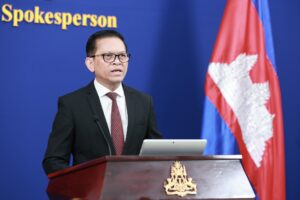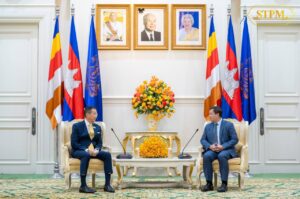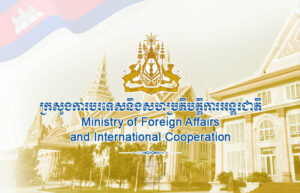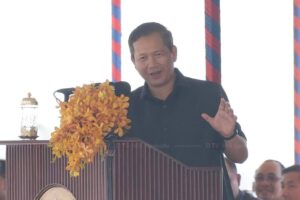Selected Comments Samdech Moha Bovor Thipadei Hun Manet, at the closing session of the annual review of education, youth and sports 2022-2023 and directives setting for 2024 academic year
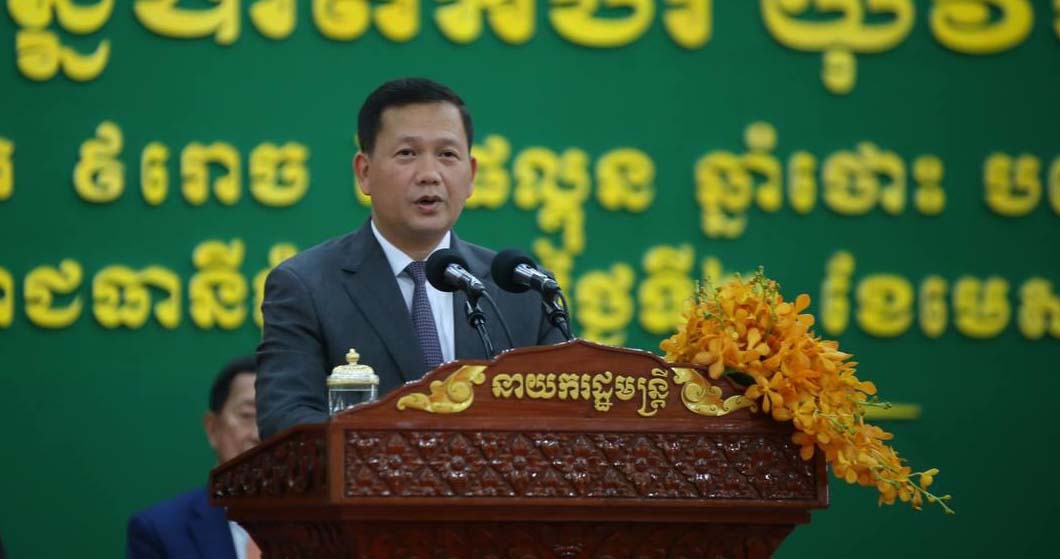 Selected Comments Samdech Moha Bovor Thipadei Hun Manet, at the closing session of the annual review of education, youth and sports 2022-2023 and directives setting for 2024 academic year
Selected Comments Samdech Moha Bovor Thipadei Hun Manet, at the closing session of the annual review of education, youth and sports 2022-2023 and directives setting for 2024 academic year
Selected Comments Samdech Moha Bovor Thipadei Hun Manet,
at the closing session of the annual review of education, youth and sports 2022-2023 and directives setting for 2024 academic year
[Unofficial translations]
********
[1]
(1) Lifelong education/training … teachers and/or Prime Minister continue learning
In the report of His Excellency the Deputy Prime Minister, Minister of Education (Youth and Sports), education is not a job that one can do in one day, in 12 years or in 16 years or in 20 years. We need a lifelong education, lifelong training, and while teachers must continue learning, the Prime Minister is too […] whereas the basic thing in ensuring the quality of people is education, especially at the grassroots level […] we have guarantees not only for elementary school and to grade 12 or the kindergarten. We plan to develop in higher education […] advanced and modern human resources to be able to compete with others. To get advanced and modern human resource who can compete with others, we have to have a solid training at the foundation level […]
(2) Designing a model/new generation school is a way to find tips and experiments to strengthen education at the foundation level
Regarding the four points that I announced at the beginning of the term to focus on schools from the kindergarten to grade 12 […] we need to see where to invest first […] I support the Ministry of Education, (Youth and Sports) in its endeavoring implementation of the many terms so far to organize either the new generation school or the model school, which is a way to find tips and experiences to strengthen the foundation of education. By setting goals for competition between schools, we all know the most important thing to do is […] to be effective and sustainable […], and now that we have a national committee, this year the program will implement (the pilot project in) the first 50 primary schools. People may ask that we already have the Ministry of Education (Youth and Sports,) why else there is a need for more committees […] let me assure you that to understand that the purpose of establishing a new generation school, a model schools and ordinary schools is not to compete one another or to make one stronger than the other. The fact is that we cannot pilot all roughly 10,000 schools at once […] due to the fact that our resources are limited […]
(3) Innovation and creativity in the curriculum required
The report of His Excellency the Deputy Prime Minister (and Minister of Education, Youth and Sports – MEYS) made it clear that in some schools we faced the lack of teachers, of buildings, and we have been able to provide only three and a half hours teaching/learning a day. What could we do if we wanted to implement all the standards? Should we invest in building 5,000 more schools or 5,000 more buildings and find more teachers? We would not be able do all that in a year. Educating people cannot wait until the school buildings are in place […] it requires innovation and creativity in the curriculum, setting out indicators and testing programs […] what are we to do when our budget is limited? […] we will soon put in practice a pilot project so that we can find the key to bridge the gap between ordinary schools where students study only three and a half hours/day to ones that extend the study time two hours more per day […] through this formula, we are creatively turning the inactive time into a more productive time at a certain level […] one day, when we find a formula that is applicable and implementable, we will share it and transfer it to the Ministry of Education (Youth and Sports) to be responsible as unified standard schools […]
(4) National committee for education does not work replace the MEYS
Soon we will establish a national education reform committee (NERC), of which HE Hang Chuon Naron will be the Deputy Chairman, to oversee the implementation. We have set up the National Committees for the reform of public health and education […] the two national committees, health and education, do not have separate secretariats. The secretariats are in the ministries themselves […] maybe in this term, the project will focus on primary education. MEYS, the model school, the new generation school, and MEYS’s other plans for other levels continue. This project focuses on primary education […] and the NERC has no principle to replace MEYS in the long run. NERC (which is chaired by the Prime Minister) is set up on a temporary basis to mobilize resources and forces to address some of the primary issues […] for example, to make the extra two hours of study/teaching time possible, there is a need to guarantee resources, taking into account the teacher’s overtime […]
(5) Should the third type of school project works, information will be provided to MEYS to formalize the joint program
We would not be able to implement a full program like the Ministry does or like the new generation of schools do […] if you ask what is the (evaluating) status of the programs that MEYS has done regarding the model schools, I’d say they are good. Whatever we are going to do, let us not interrupt them. Let us try (another school form project) first. If it works, we will provide this information to MEYS so that in the following years, MEYS can plan to formalize them and out them into a joint program […] these are all ideas and trials to answer the question of what needs to be strengthened of the foundation of (education), what do we strengthen, where to strengthen? and how to strengthen? […] I support the annual workshops that always bring in experiences […] gather, summarize, evaluate and suggest where to improve, where to strengthen, where to share, where not to share, so that we can fulfil this strengthening purpose, based on inputs/feedbacks provided by the teachers, staff, education officials across the country […]
(6) Assure training quality needed to solve facing problems
Going abroad, I met investors. I told them that Cambodia’s human resources have had trainings and are able to capture technological training too. Our education is strong, but still, we need to know where education should focus, or education of what […] for an industrial demand, were there need a lot of education […] if they need a robot operator, we have to teach our people that […] we work to together to assure the training quality needed with which students acquire knowledge, behavior, discipline, morality, and the most important of all is to ensure that we solve the problems that we are facing – the lack of teachers, the completion of infrastructure […] and the same is true in training […] normally, I sent trainers to seminars and/or short courses so that after they finish the training, they recompose those lessons for teaching […] as for the 50 school to take on in the pilot project, we will basically work on the experience of a school that has already been successful without using further resources from above […]
(7) Equity funds could create misunderstandings about obliged contributions
I have seen that there is this trend to create an equity fund. My suggest is that such creation should not be entailed. It could mislead to understand that it requires an obligation to contribute money […] (I think what we should do is) to make a good school. Parents who love their children will help at their wills. If they do not have money, they can be helpful in paying attention to their children. Wherever they could, let them do. However, we must avoid putting them obligations, especially financial ones […] If they wanted to create (such fund), let them do it, and if they want contribute, it would be entirely up to them. Let it not be (a form of obligation) […] Parents and students are the actors of education. School and home educations are very important to help eliminate the influence of outside society. There are only three educations – at home, at school and in society. If the school and the house are united and strengthened, the social influence can somehow be resisted […] The education by parents and teachers are the factors that determine the human inner self value […]
(8) Review and strengthen the role of the district education offices
[…] Let us look at the effort to strengthen the role of the district education offices […] we have decentralized a lot (of functions) to the district level, where the district education offices play a professional role for the works of the district (administration) and for the education department. Previously, we decentralized (functions) to the commune level and to the provinces. However, we have not yet done it at the district level […], as in some places, we still lack human resource, and in some others, we lack infrastructure […] the district education offices are the frontline specialist […] the offices of education and health are the assistants who advise the district governors, the governing board of the district and also a connection to the line Ministries/offices […]
[2]
(9) Education and Public Function to think of contract teachers
I urge MEYS and the Ministry of Public Functions to figure out the concept of a new technical framework – contract teachers […], who must be trained in the same framework […] The contract teachers are to be entrusted with the roles, duties, rights and responsibilities, benefits, salaries like normal teachers. It is just that there is not a lifetime obligation […] if they have the right qualifications, they can be given the roles, except for some important functions, for example, we are thinking if the post of deputy director of a department can be entrusted to the contract officials […] We think about qualification so that we can open a gate or else the gate is open but no one enters […] (in addition to that) we have to solve two problems – which is to choose the right person qualified for the demanded job and to keep them for the mission […]
We are considering pension for contract teachers. It means that whether s/he has worked for the government and for the private sector, we are going to add up their work seniority […] s/he does not have to work for the state for 30 years to get a pension […] The consideration of human resources must be flexible […] our people no longer have a bias between being in the private and/or in the state, because they can add their seniority together […] the selection of officials is based on qualifications, not on seniority of where s/he was […]
[3]
(10) Strengthening and compaction phase to use resources effectively
I have seen that there is a plan to create a cyber university […] previously, I said that we do not have to set up R&D center anywhere but take a school as a base for us to put resources into it. The teachers are already there. We share experiences. Now is the consolidation and the compaction phase. Sometimes we have multiple institutions working on just one job, which, in that sense, we did not coordinate resources, an there have been overlaps and less resources distribution […]
(11) Mines and Energy develops a policy framework and Public Works in charge of EV technical management
On the digital side is the same […] I just instructed to carry out the task of splitting the jobs – who would do what – regarding EV policy […] the electric vehicles need electricity. Who issues the policy regarding electricity? It is the Ministry of Mines and Energy […] and yesterday there came the suggestion that the Ministry of Mines and Energy be given a separate task to work on policy framework, which includes equipment management and price policy, whereas the Ministry of Public Works is responsible for EV technical management […] I must make the decision (regarding this matter) or I would have to face with the people when the EV policy is abnormal or when the investment hits unresolvable issue […]
(12) Education and Telecommunications digital training in accordance with standard policy About this digital training, I am asking for a certainty of it. Let us work together on a policy standard.I would love to have the cooperation (of the MEYS) with the Ministry of Posts and Telecommunications so that the two ministries do not do the same training, but with different standards. I ask for the same standard, because in the future it will be incorporated into schools. MEYS issues its educational programs, but it needs the help of the Ministry of Posts and Telecommunications’ infrastructure. In this regard, we must work on this policy altogether from the beginning, so as not to have inconstructive competition […]./.

